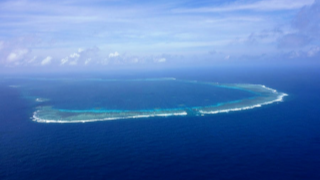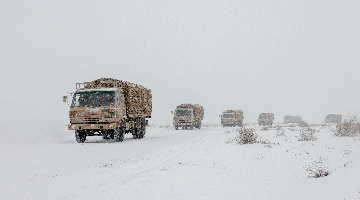
Israeli soldiers cross the security fence, moving toward the so-called Alpha Line that separates the Israeli-annexed Golan Heights from Syria, in the town of Majdal Shams, on Sunday. MATIAS DELACROIX/AP
Concerns are growing over the US-enabled "Greater Israel" aspirations after Israel approved a plan to double the settler population in the occupied Golan Heights, sparking condemnation from neighbors and prompting observers to accuse the Israeli government of creating more conditions for conflicts.
Israeli Prime Minister Benjamin Netanyahu's office said on Sunday that the government approved an $11 million plan to double the population in Golan Heights, with the money going toward education, renewable energy and the establishment of a student village. An estimated 50,000 people live on the Israeli side of the heights, split between Druze and Jews.
Israel captured most of the strategic highlands from Syria in the 1967 war and unilaterally annexed them in 1981, despite international condemnation.
Analysts said that for Israel, defeating Hamas has now become secondary to the occupation of Gaza and other areas, given the continued civilian purging with bombings and strikes. The United States has approved at least $17.9 billion in security assistance to Israel since Oct 7 last year.
Saudi Arabia's Foreign Ministry denounced Israel's plan, blaming Israel for continued "sabotaging of Syria's prospects for restoring its security and stability".
The United Arab Emirates Foreign Ministry issued a similar statement, saying the plan categorically rejects "all measures and practices aimed at changing the legal status in the occupied Golan Heights".
Abdul Wahed Jalal Nori, an analyst and lecturer at the Department of Fundamental and Inter-Disciplinary Studies at the International Islamic University Malaysia, told China Daily that the aim of Israel's plan to broaden the population in the Golan Heights is "to cement its control over this territory".
The move violates international law, he said, including the United Nations Security Council resolutions, which recognize the Golan Heights as Syrian territory.
"This action, Israel says, is justified under the pretext of so-called 'self-defense'. However, the distinction between legitimate self-defense and occupation is blurred when the occupation creates conditions for hostility and more conflict," said Abdul Wahed, who is the author of the book State-building under Foreign Occupation: The Case of Iraq 2003-2008.
Undermining peace
"Such actions undermine prospects for peace, a two-state solution and regional stability. There will be more wars, perhaps bigger major wars," he added.
Netanyahu's office said in a statement on Sunday that the prime minister reiterated leading the "change" in the Middle East, including in his discussions with US President-elect Donald Trump and "the need to complete the victory".
"In order to ensure that this does not recur, ever, we have taken a series of intensive actions in recent days. Together with Defense Minister (Israel) Katz, I have directed the (Israel Defense Forces) to thwart the potential threats from Syria and prevent terrorist elements from taking control close to our border," the statement said.
Belal Alakhras, a political analyst and researcher at the University of Malaya in Kuala Lumpur, told China Daily that the US has long been playing regional conflicts "for its own interest and strategic position in the region".
"It wanted every party (to be) weak, engaged in unlimited cycles of conflict without settlement or final resolution," Alakhras said. The US actions have only been "fueling the situation, rather than helping any party to genuinely win, even close allies", he said.
Syria was almost neutralized because of its internal calculus and challenges, but the situation on its border "is more vulnerable than ever", he added.
"The US and Israel are trying to use this change and exploit it for (their) own advantage, publicly announcing conditions for the removal of current rulers of Syria from terror lists. Israel foolishly thinks it can make advantage by more military advances. But this only widens its quagmire," he said.
Meanwhile in Gaza, the situation remains dire and attempts are underway to negotiate a prisoner swap deal, he added.
The Palestinian death toll from continuing Israeli attacks on the Gaza Strip has topped 45,000, Gaza-based health authorities said on Monday.
Omer Behram Ozdemir, a lecturer at the Department of Political Science and International Relations at Ibn Haldun University in Turkiye, said Israel "will not make an unreasonable move" like occupying large provinces such as Daraa and Sweida, because such a move would be "irrational" for Israel, both demographically and militarily.













